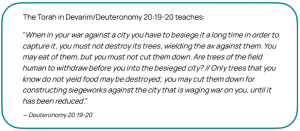How do I live in line with what the planet can provide?
Prep for the Session
At-a-Glance
This resource provides an opportunity to engage with the tensions that abound in our own use and consumption of resources. It prompts us to think about the ways that respect – for others, for the world, for natural resources – manifests itself in the choices we make. It presents a key Jewish text as framing, pinpointing the delicate balance we need to hold in considering our relationship to the natural world. Learners will have the opportunity to use a quantitative footprint calculator tool and analyze the results. It concludes with an opportunity to think about ways to minimize our ecological footprints, as we integrate the value of respect most fully in our lives.


- Digital device to access footprint calculator
- Pens and paper for Make Meaning and Take Action section

- As a full group or in pairs
- For a reflective exercise with a practical takeaway
Let’s Get Started
FRAME THE ISSUE

Read the following for context:
The world’s natural resources are being depleted at an alarming rate, faster than they can replenish themselves. According to the UN’s most recent Global Resources Outlook, resource extraction has more than tripled since 1970, including a fivefold increase in the use of non-metallic minerals and a 45 per cent increase in fossil fuel use.
Facilitator prompts the group:
- When do you most often think about the resources you are using?
- What prompts you to do so?
Some questions to consider when looking at our living patterns and how we use the world’s resources include (these are thought questions, not to answer them now):
- How can we live in a world where we use the things we need to survive, but in delicate balance with conservation efforts so that we don’t deplete the world of its limited resources?
- Where can intentionality play a part so that we are efficient in our use of resources, and align our actions and values – from the micro to the macro – via what we choose to do and what we avoid to do?
Through the exploration below we will have the chance to consider these tensions and how they play out in our own lives and the choices we make.

Facilitator prompts the group:
- Have you ever felt like you had to choose between doing right by the environment and being free to live your ‘normal’ life? How did that tension make you feel and what choice did you ultimately make? Describe one specific lived experience.
- Do you think you consume more or less resources than others in your community? What about in comparison to people of your age in other countries? Share why you believe this to be the case.
Engage with the value by reading the following:
Looking at this issue through the value of respect can offer a point of entry to think about the choices we make.
Respect in this context can be defined as honor and care shown towards someone or something that is considered important. The value of respect has many applications — to oneself, to another person (whether known or a stranger), to living things, to property, to the natural world, to tangible and abstract ideas, to all.
Facilitator Prompts the Group:
- Think about how you treat something, someone or some notion that you respect.
- In day-to-day happenings, how do you practice respect and where does it fall by the wayside?
ANCHOR IN JEWISH WISDOM

Jewish tradition emphasizes the central importance of respecting, protecting and preserving the world’s resources. This ethical principle, known as Bal Tashchit– “Do not destroy or waste” – directly relates to our urgent ecological challenges, ongoing climate degradation, and humans’ undeniable impact on the environment.

Read the following two pesukim/verses and answer the prompts that follow:

Facilitator prompts the group:
- What is the specific context of this case?
- In your own words, explain the “reality” that the Torah is presenting here. How does that make you think about destruction of resources in general?
- In what way are trees compared to humans? Why?
Read the following:
This Biblical commandment is central to ecology and environmentalism, decreeing that respect sits at the core of our relationship to the natural world and one shall not destroy or waste unnecessarily. It outlines the need for consciousness in regard to the critical role of maintaining the plants, natural resources, and ecosystems upon which we depend for food, for infrastructure, for survival.
It calls on us to meet our needs, but not go overboard, a delicate balance and subjective line that is often difficult to pinpoint. Healthy ecosystems have tangible benefits which cannot be replaced.
Facilitator prompts the group:
- Name one “ecosystem service” (a benefit to humans provided by the natural world, for example, fresh fruits and vegetables, clean drinking water) from which you benefit on a daily basis. Is that in peril? Why or why not?
- How would your life change if it were no longer readily available?
ACTIVITY

How many Earths?
Read the following:
Now, let’s dive into specific ecological footprints: How many earths are required to support each of our individual lifestyles? We are going to use a quantitative footprint calculator tool to estimate our energy, resource and land use, as well as what is needed to account for the waste and emissions that our consumption patterns produce.
 |
Scan the QR Code or click this link to open the Global Footprint Network Calculator and answer the series of questions as they relate to your specific lifestyle. |

Prompt for individuals:
- Spend a few minutes looking at your personal results. Review the details of your ecological footprint, carbon emissions, and which categories of your life are the most resource-intensive — whether visible or invisible, direct or indirect, seemingly within your control or linked to infrastructure and public services.
Prompts for small groups:
- How many earths are required to support your lifestyle? What did you learn? What surprises you most?
- How do your results compare to others in your country and those around the world?
- How do you feel about these findings?

Prompt action

Read the following:
Knowledge is power.
Calculating our ecological footprints is not meant to shame anyone, nor put all (or even the majority) of the onus on you, as one person, to make shifts and thereby somehow “solve” the climate crisis. Industries and governments must enact sweeping reforms to safeguard people and planet, and we have to continue to hold them accountable for the consequences of their action and inaction! But being aware of our own ecological footprints is an important starting point from which we can better advocate for and affect change.
Reducing individual and collective footprints has measurable, wide-ranging, positive impacts on the planet and people who live upon it. By taking clear steps to conserve natural resources, reduce waste and pollution, and protect species and ecosystems worldwide, we are practicing respect for humans, living things and the Earth itself, so it can be sustained for us and future generations.
Facilitator prompts the group:
- Where do you think you can begin to minimize your ecological footprint? Share five ideas! (Starting points include buying less, changing dietary habits, swapping and sharing goods, walking/biking/ride sharing/public transiting, choosing energy and water efficient appliances, etc.)
- Which points of entry seem most accessible to you logistically and financially? Outline why and commit to at least one… with more to follow!

Close with intention

In the exploration we just experienced, we took a contemporary issue – ecological footprints and consumption – and explored it through the value of respect. Doing so offers us a way to think about what drives the ecological choices we make, and to recognize the competing desires on both sides of the choice spectrum. Today’s conversation provided a chance for us to explore how being aware of our own ecological footprints can be an important starting point from which we can better advocate for and affect global change, even when it’s hard and we might otherwise desire different choices.
Go around the room and ask everyone who wants to share a reaction to one of the following prompts:
- As a result of this session, I now think differently about ……
- To sensitize myself to the value of respect in the ecological choices I make, I will now …





 Back to How do I live in line with what the planet can provide?
Back to How do I live in line with what the planet can provide?